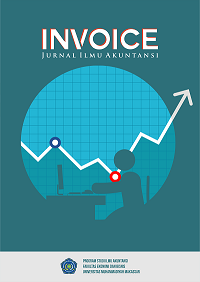PENGARUH TEKNOLOGI INFORMASI, KEAHLIAN PEMAKAI DAN INTENSITAS PEMAKAIAN TERHADAP KUALITAS INFORMASI AKUNTANSI PADA PT. BANK RAKYAT INDONESIA (PERSERO), TBK MAKASSAR
DOI:
https://doi.org/10.26618/inv.v3i1.4970Abstract
This research is using quantitative study aimed to see the influence of information technologi use, user expertise, and the intensity of usage on the quality of accounting information. The population of this study was PT Bank Rakyat Indonesia (Persero), Tbk, Makassar Branch. The selection of the sample with total sampling methods. The data used in this study of primary data. Data analysis techniques using multiple regression analysis. The results of this study indicate that information technologi use, user expertise, and the intensity of usage have a positive effect and significant on quality of accounting information.
Keyword: Information Technologi Use, User Expertise, The Intensity Of Usage, and Quality Of Accounting Information
References
Akhmad, A., & Marsuni, N. S. (2019). Causality Relationship of Poverty, Unemployment Rate, and Economic Growth in South Sulawesi Province. Jurnal Ekonomi Balance, 15(2), 231-241.
Azhar Susanto. 2013. Sistem Informasi Akuntansi. Bandung: Lingga Jaya.
Dotulong, Ilham, Niswatin, M. Valentina. 2015. Pengaruh Penggunaan Teknologi Informasi dan Keahlian Penggunaterhadap Kualitas Informasi Akuntansi (Studi Empiris pada Diler Mobil di Kota Gorontalo). Jurnal Akuntansi Universitas Negeri Gorontalo.
Evania, Nova. 2016. Pengaruh Penggunaan Teknologi Informasi, Keahlian Pemakai dan Intensitas Pemakaian Terhadap Kualitas Informasi Akuntansi (Studi Pada Satuan Kerja Perangkat Daerah Kabupaten Indragiri Hulu). JOM Fekon, Volume 3 Nomor 1, hal 635-649.
Fitriyani, Riska. 2014. Pengaruh Penggunaan Teknologi Informasi, Keahlian Pemakai dan Intensitas Pemakaian terhadap Kualitas Informasi Akuntansi. Jurnal Ekonomi dan Bisnis Universitas Bengkulu.
Fowzia, R., & Nasrin, M. 2011. Appreciation of Computerized Accounting System in Financial Institutions in Bangladesh. World Review of Business Research, I.
Ghozali, Imam. 2016. Aplikasi Analisis Multivariate dengan Program SPSS. Semarang: Badan Penerbit UNDIP.
Hall, James. 2013. Sistem Informasi Akuntansi, Edisi 4. Jakarta: Salemba Empat.
Jogiyanto. 2003. Sistem Teknologi dan Informasi. Yogyakarta: AndiYogyakarta.
Landau, Siti Nurannisa. 2018. Pengaruh Penggunaan Teknologi Informasi, Keahlian Pemakai dan Intensitas Pemakaian terhadap Kualitas Informasi Akuntansi pada Satuan Kerja Perangkat Daerah (SKPD) Kota Medan. USU Medan.
Marsuni, N. S., & Rismawati, R. (2018). Income And Cost Analysis Of Business Activities Development At The Business Development Center (P2b) State Islamic University Of Makassar. Jurnal Ekonomi Balance, 14(1), 129-136.
Marsuni, N. S., & Ahmar, A. A. (2018). Analysis of Income Level of Cocoa Farmers in Supporting Regional Development in Iwoimendaa District, Kolaka Regency, Southeast Sulawesi Province. Jurnal Ekonomi Balance, 14(2), 247-252.
Marsuni, N. S., Rohmatunnisa, I., Nirwani, N., Pontoh, G. T., & Mediaty, M. (2021). Analysis Of Accounting Information Systems (SIA) In Preventing Fraud. SEIKO: Journal of Management & Business, 4(2), 94-102.
Marsuni, N. S. (2019). Pengaruh Praktik Islamic Corporate Social Responsibility (ICSR) Terhadap Kinerja Keuangan Pada Bank Umum Syariah Periode 2014-2018. Skripsi, Universitas Muhammadiyah Makassar, Makassar.
Marsuni, N. S. (2021). Effective Strategy in Overcoming Challenges in Implementing Carbon Tax Policy. GoodWill Journal of Economics, Management, and Accounting, 1(1), 24-29.
Marsuni, N. S., & Insirat, M. N. (2021). Analysis of the Effects of Carbon Taxes on Sustainable Business Operations. GoodWill Journal of Economics, Management, and Accounting, 1(2), 43-47.
Meilani, F., & Marsuni, N. S. (2019). Implementasi Program Corporate Social Responsibility (CSR) dan Dampaknya Terhadap Kinerja Keuangan PT. Buana Sanjaya di Papua Barat. Jurnal Ilmu Manajemen Profitability, 3(1), 36-53.
Nofryanti. 2015. Pengaruh Penggunaan Teknologi Informasi dan Keahlian Pemakaiterhadap Kualitas Informasi Akuntansi dan Dampaknya terhadap Kinerja Organisasi. Jurnal Ekonomi dan Bisnis Universitas Pamulang, Volume 3 Nomor 1, hal 644-655.
Rahmi, Mardiah. 2013. Pengaruh Penggunaan Teknologi Informasi dan Keahlian Pemakai terhadap Kualitas Informasi Akuntansi. Jurnal Akuntansi Universitas Negeri Padang.
Sofianti, Diamonalisa, Nurhayati, Nunung, Neisya. 2015. Effects on Information Technology and Organizational Culture on the Performance of Accounting Information Systems (Survey in Bank “X” Branch Offices in Bandung). European Journal of Accounting, Auditing and Finance Research, Volume 3 Nomor 9, hal 65-73.
Sridarmaningrum, L. G. 2018. Pengaruh Efektivitas Penerapan Sistem Informasi Akuntansi, Kesesuaian Tugas, Kenyamanan Fisik Dan Lingkungan Kerja Pada Kinerja Karyawan LPD Di Kota Denpasar. Universitas Udayana, Denpasar.
Sugiyono, 2013. Metode Penelitian Bisnis (Pendekatan Kuantitatif, Kualitatif, Dan R&D). Bandung: CV Alfabeta.
Downloads
Published
Issue
Section
License
Authors who publish with Invoice: Jurnal Ilmu Akuntansi agree to the following terms:
Copyright Ownership
The copyright of all articles published in this journal remains with the author(s). However, the authors grant Invoice: Jurnal Ilmu Akuntansi the right of first publication with the work simultaneously licensed under a Creative Commons Attribution 4.0 International License (CC BY 4.0). This license allows others to share, copy, redistribute, adapt, and build upon the work for any purpose, even commercially, as long as proper credit is given to the original author(s) and the source.Licensing and Access
Invoice: Jurnal Ilmu Akuntansi provides immediate open access to its content on the principle that making research freely available to the public supports a greater global exchange of knowledge. All published materials are available freely without subscription or payment and can be accessed, downloaded, and reused by any user provided that appropriate attribution is given.Permission for Reuse
For uses not covered by the CC BY 4.0 license, such as commercial reprints, translations, or any form of adaptation without clear attribution, users must obtain written permission from the editorial team. Requests for such permissions can be directed to the editorial office at: [insert journal email here].Plagiarism and Originality
Authors are responsible for the originality of their submissions. All articles are screened for plagiarism using appropriate tools before acceptance. Manuscripts found to contain unoriginal content or infringing materials will be rejected or retracted as per journal policy.

